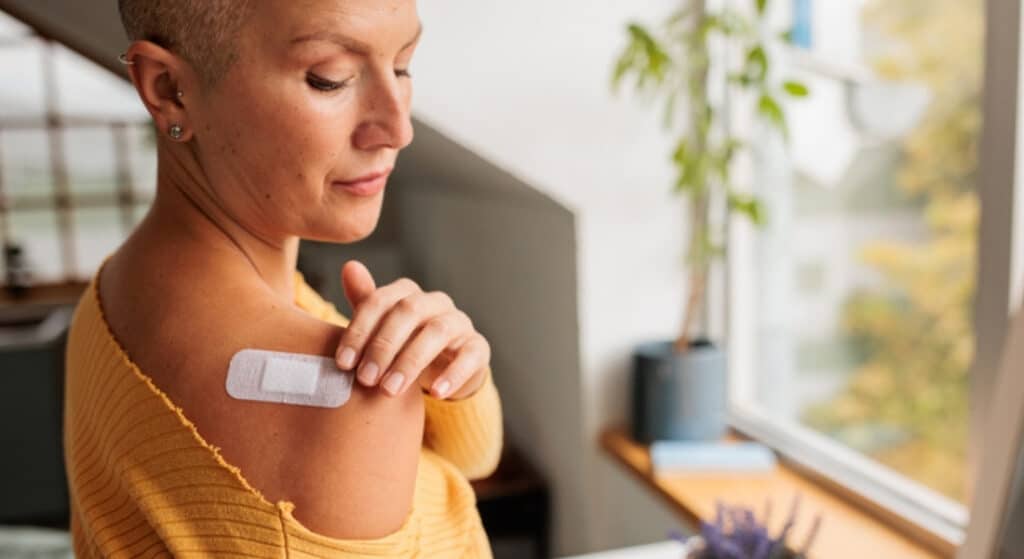For women in perimenopause or menopause, gaining weight around the midsection can feel inevitable. But the latest GLP-1 medications could offer a solution.
“Weight gain is a main concern that women come in to see me about during perimenopause and menopause,” says Christine McRae, PA-C, MSCP, a physician assistant and Menopause Society Certified Practitioner at Methodist Family Health Center – Murphy. “Women can absolutely lose weight during perimenopause and menopause — and keep it off.”
Hormonal shifts are the root of what some women refer to as “menopause belly.”
Estrogen and progesterone decrease as women age, causing metabolic changes. One of those changes is a decline in muscle mass, which slows metabolism and contributes to weight gain, mostly around the midsection.
“When women go through menopause, we all lose muscle mass,” McRae says. “Muscle also helps with metabolism and weight loss.
That’s why exercising regularly and eating healthier are the most effective approaches to limiting weight gain. But McRae says GLP-1 medications could help women who feel like they have tried every diet and exercise fad.

WHERE GLP-1S COME IN
Originally developed to treat type 2 diabetes, GLP-1 injections like Ozempic, Wegovy, and Mounjaro have emerged as a beacon of hope for weight loss. Their effectiveness and popularity among users are a testament to the potential they hold for women struggling with weight gain during menopause.
McRae says GLP-1s can be especially helpful for women navigating hormonal changes.
“The medication will further reduce insulin resistance and decrease visceral [belly] fat, which puts women at risk for heart disease and diabetes after menopause,” she explains.
Hormone therapy can address about 60% of visceral fat on its own, McRae adds. When combined with a GLP-1 medication, the results were significantly better with women seeing an of average 12% to 16% more weight loss.
But GLP-1s offer other benefits even without hormone therapy.
“You’ll see better weight loss results and better sleep using a GLP-1 medication,” McRae adds. “When combined with HT, women are able to build and preserve muscle.”
From routine checkups to advanced gynecological surgery, Methodist has the services women need at every stage of life. Learn more at MethodistHealthSystem.org
ARE THEY RIGHT FOR YOU?
Most women are good candidates for GLP-1 medications, McRae says, but she notes a few exceptions.
“People with a personal or family history of certain types of thyroid cancer or other specific conditions may not be a good fit,” she says. “But in general, these medications are very well tolerated and safe when prescribed appropriately.”
Still, McRae stresses that GLP-1s aren’t a magic solution.
“These medications work best when paired with lifestyle changes, especially a healthy, anti-inflammatory diet,” she says.

DIET AND MENOPAUSE
McRae recommends a high-protein, high-fiber meal plan that includes whole foods and reduces processed ingredients, a major culprit for inflammation in the body.
Experts suggest lean meats like chicken and fish, eggs, beans, fruits, vegetables, and lots of water. It’s also best to limit or eliminate alcohol and fried foods because these also contribute to inflammation.
Reducing inflammation helps encourage weight loss and overall health during menopause.
“So much of what’s out there and part of our diets is processed foods,” McRae says. “Anything prepackaged or preprepared is not good for us. Try to eliminate as much processed food as possible.”
For women struggling with their weight during perimenopause and menopause, taking charge of their weight by eating healthy can be empowering.
“You don’t have to accept the weight gain as part of aging,” McRae says. “We have tools that work. With the right plan, women can lose weight, feel better, and lower their risk of serious health conditions, all while going through this very natural stage of life.”






